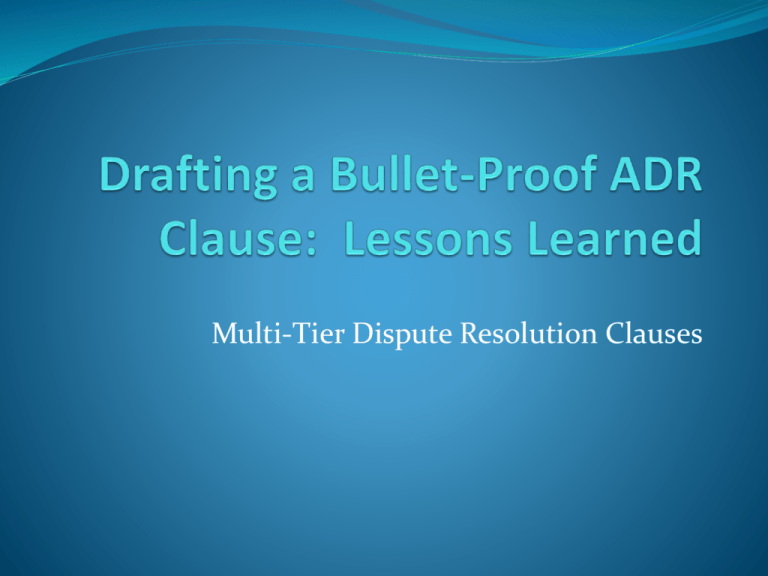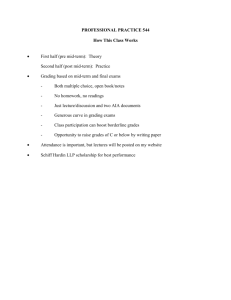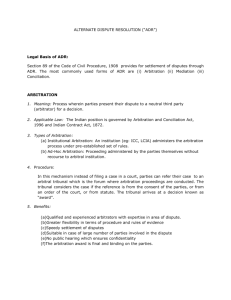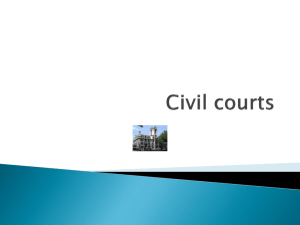Lessons Learned – Multi-Tier Dispute Resolution Clauses
advertisement

Multi-Tier Dispute Resolution Clauses Basics A clause may provide first for non-binding mediation under mediation procedures. If the mediation is unsuccessful, the clause authorizes the dispute to be resolved by binding arbitration pursuant to specific arbitration rules. A three tier clause may provide first for negotiation, which, if unsuccessful, is followed by non-binding mediation, then by binding arbitration. Goal of the Clause Prompt, cost-effective dispute resolution Appropriate escalation of ADR techniques Negotiation and mediation required before “litigation mind-set” takes hold Conservation, if possible, of the underlying relationship Typical Uses: Long Term or “Relationship” Agreements Joint Ventures Distributorship or Licensing Agreements Supply Agreements Long Term Service Agreements Governing Documents for Closely Held Entities Construction or Infrastructure Projects Example Clause: ICDR Model Clause In the event of any controversy or claim arising out of or relating to this contract, or a breach thereof, the parties hereto agree first to try and settle the dispute by mediation, administered by the International Centre for Dispute Resolution under its Mediation Rules. If settlement is not reached within 60 days after service of a written demand for mediation, any unresolved controversy or claim arising out of or relating to this contract shall be settled by arbitration in accordance with the International Arbitration Rules of the International Centre for Dispute Resolution. The parties should consider adding: “The number of arbitrators shall be (one or three)”; “The place of arbitration shall be (city and/or country)”; “The language(s) of the arbitration shall be ___.” Example Clause: ICDR Model Clause (Three Tier) In the event of any controversy or claim arising out of or relating to this contract, or the breach thereof, the parties hereto shall consult and negotiate with each other and, recognizing their mutual interests, attempt to reach a solution satisfactory to both parties. If they do not reach settlement within a period of 60 days, then either party may, by notice to the other party and the International Centre for Dispute Resolution, demand mediation under the Mediation Rules of the International Centre for Dispute Resolution. If settlement is not reached within 60 days after service of a written demand for mediation, any unresolved controversy or claim arising out of or relating to this contract shall be settled by arbitration administered by the International Centre for Dispute Resolution in accordance with its International Arbitration Rules. Example Clause: ICC Model Clause In the event of any dispute arising out of or in connection with the present contract, the parties agree to submit the matter to settlement proceedings under the ICC ADR Rules. If the dispute has not been settled pursuant to the said Rules within 45 days following the filing of a Request for ADR or within such other period as the parties may agree in writing, such dispute shall be finally settled under the Rules of Arbitration of the International Chamber of Commerce by one or more arbitrators appointed in accordance with the said Rules of Arbitration. Example Clause: LCIA Model Clause In the event of a dispute arising out of or relating to this contract, including any question regarding its existence, validity or termination, the parties shall first seek settlement of that dispute by mediation in accordance with the LCIA Mediation Rules, which Rules are deemed to be incorporated by reference into this clause. If the dispute is not settled by mediation within [............] days of the appointment of the mediator, or such further period as the parties shall agree in writing, the dispute shall be referred to and finally resolved by arbitration under the LCIA Rules, which Rules are deemed to be incorporated by reference into this clause. The language to be used in the mediation and in the arbitration shall be [............]. The governing law of the contract shall be the substantive law of [............]. In any arbitration commenced pursuant to this clause, (i) the number of arbitrators shall be [one/three]; and (ii) the seat, or legal place, of arbitration shall be [City and/or Country]. Negotiation Options for Multi-Tier ADR Clause Requirement of preliminary meeting to negotiate within short period of notice or other event giving rise to dispute Requiring specific parties (i.e. project manager or CEO) to attend negotiation and/or mediation Escalation of negotiation representatives within a defined timetable (i.e. project manager negotiates within 10 days, then, if not resolved, CEO meet within 25 days) Multi-Tier Clause Pitfall: Condition Precedent Definition: A Condition Precedent is an event which must occur, unless its non-occurrence is excused, before performance under a contract becomes due, i.e., before any contractual duty arises. See RESTATEMENT (2D) CONTRACTS § 224 Multi-Tier Clause Pitfall: Condition Precedent The clause creates a condition precedent (mediation taking place) before performance under the arbitration clause becomes due A recalcitrant party simply refuses to participate in mediation, rendering the arbitration clause unenforceable until mediation takes place. Result: no resolution is possible Condition Precedent Example: HIM Portland, LLC v. DeVito Builders, Inc., 317 F.3d 41 (1st Cir. 2003). Contract for motel renovation Multi-tier ADR clause was drafted to create a condition precedent (mediation before arbitration) Party sought to compel arbitration The court declined to compel arbitration, as the condition precedent (mediation) had not taken place Condition Precedent Solutions: Simple time expiration for mediation: “If settlement is not reached within 60 days after service of a written demand for mediation…” More elaborate carve out: “In the event mediation fails to resolve all of the issues between or among the Parties, the Parties forgo their option to mediate, or if mediation is not held within 60 days of the event giving rise to the dispute, then the matter or any remaining matters shall be submitted to final, non-appealable arbitration. The arbitration shall be…” Multi-Tier Clause Pitfall: Enforceability of the Preliminary Tier(s) of the Clause Problem: Agreement to Negotiate or Mediate may not be Enforceable in the Seat of the ADR Clause. May be found to be an illusory agreement or an unenforceable “agreement to agree” under the law of the seat of the ADR clause Should court intervention be required, a local court will refuse to enforce the clause Mediation Clauses Enforceable in: Almost all U.S. Jurisdictions Germany (German Federal Supreme Court) France (French Cour de Cassation) England (English Commercial Court) (recent change in the law on this issue) New South Wales, Australia (Supreme Court of New South Wales) Ireland (Irish High Court) Klaus Peter Berger, Law and Practice of Escalation Clauses, 22 ARBITRATION INT’L 1, 7-8 (2006). Enforceability Issues Solutions: Seat your Multi-Tier ADR Clause in a jurisdiction which will enforce the preliminary tiers If you are considering placing the seat in an unfamiliar jurisdiction, Consult Local Counsel Include provisions giving the arbitrator the power to require specific performance of preliminary tiers of the ADR clause






